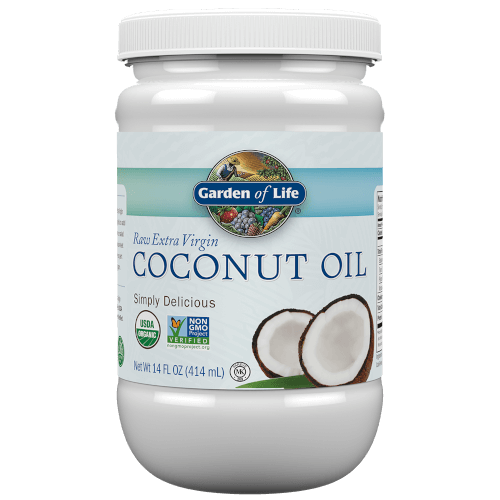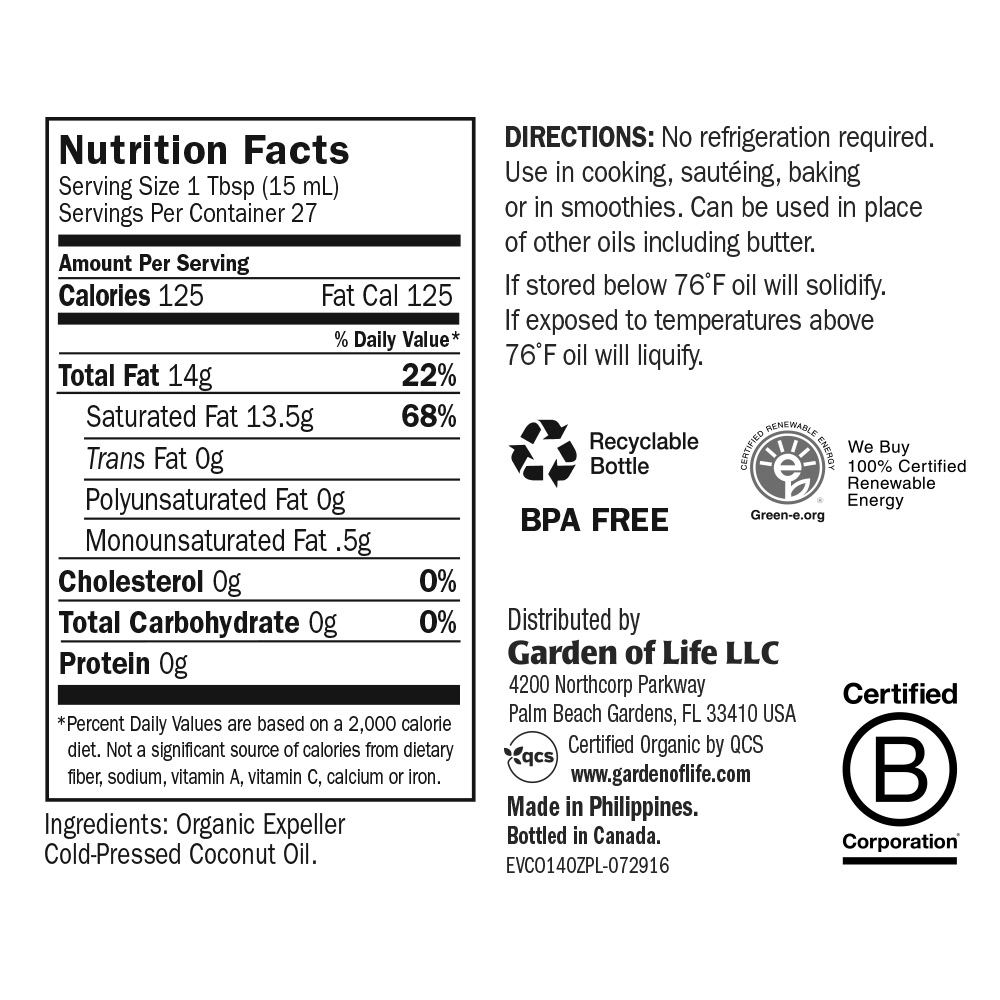Garden of Life Coconut Oil Extra Virgin 14 oz BPA-Free Plastic Jar

| Coconut Oil Extra Virgin 14 oz BPA-Free Plastic Jar | |
| Retail Price | $17.99 |
| Discount 20% | $3.60 |
| Your Price | $14.39 |
| More Info | |
More Garden of Life Products
Garden of Life Coconut Oil
Garden of Life Coconut Oil is among the healthiest, most versatile dietary oils in the world. An excellent cooking oil with its natural coconut flavor and aroma, we think it is simply the best tasting, most aromatic coconut oil on the planet. Garden of Life Extra Virgin Coconut Oil is a stable, healthy saturated fat that is naturally free from trans-fatty acids. It contains medium-chain fatty acids, such as lauric acid, which have a shorter chain length than most animal derived long-chain saturated fatty acids. Newer research supports the theory that saturated fats rich in medium-chain fatty acids, like those found in extra virgin coconut oil, are beneficial. In fact, consumption of coconut oil at recommended levels, along with a healthy diet and lifestyle, helps maintain already healthy levels of cholesterol. Unlike refined coconut oils, Garden of Life Coconut Oil is not hydrogenated, bleached, refined or deodorized. It is produced using the same methods farmers have used for centuries. Meat from only the freshest, organically grown coconuts is shredded and cold-pressed to create coconut milk, and then fermented to achieve a great taste and aroma. |
|||
|
Garden of Life Extra Virgin Coconut Oil Q&A I thought tropical oils were unhealthy. What makes Garden of Life? Extra Virgin Coconut Oil different? What makes this coconut oil extra "virgin?" How does Garden of Life Extra Virgin Coconut Oil benefit my health? What is wrong with all those other oils? What makes Garden of Life Extra Virgin Coconut Oil better than other coconut oils? |
||
|
Early researchers failed to distinguish between saturated, monounsaturated and polyunsaturated fats. They assumed all fats (including coconut oil) were unhealthy because they raised serum cholesterol levels. But in revisiting those studies, researchers discovered that all fats are not created equal. Newer research proves saturated fats rich in the medium chain fatty acids like those found in Garden of Life Extra Virgin Coconut Oil are very beneficial. In the body, lauric acid, which accounts for 50-55% of the total fatty acids in Garden of Life Extra Virgin Coconut Oil, converts to monolaurin, a powerful monoglyceride that destroys viruses, bacteria and fungi.
What makes this coconut oil extra "virgin?"
Unlike refined coconut oils, Garden of Life Extra Virgin Coconut Oil is not hydrogenated, bleached, refined or deodorized. It is produced using the same methods Filipino farmers have used for thousands of years. Meat extracted from only the freshest, organically grown coconuts is shredded and cold-pressed to make coconut milk. The milk is left to ferment 24-36 hours, during which time the oil separates. The end-product is an aromatic coconut oil that retains its taste, aroma and nutritional value for a very long time. In fact, Garden of Life Extra Virgin Coconut Oil has a longer shelf life than any other plant oil.
How does Garden of Life Extra Virgin Coconut Oil benefit my health? Although many people equate fat with weight gain, clogged arteries and high blood pressure, certain fats actually help prevent those conditions and are essential to good health. Coconut oil has been shown to reduce the symptoms of digestive disorders and support overall immune function.
In addition, a study conducted in Yucatan, where coconut oil is a staple, showed metabolic rates of people living there to be 25% higher than in comparable test subjects living in the U.S. Increased metabolic rate is a key to healthy weight management and could account for the leanness of people living in areas where coconut oil is consumed on a daily basis.
What makes Garden of Life Extra Virgin Coconut Oil better than other coconut oils?
Because Garden of Life Extra Virgin Coconut Oil is traditionally prepared and minimally processed, it retains all of its medium-chain fatty acids and other beneficial compounds. Refined versions may have a bland or burnt taste as a result of the refinement process. Additionally, Garden of Life Extra Virgin Coconut Oil delivers the aroma and flavor of fresh coconuts.
What is wrong with other cooking oils? Avoid frying with polyunsaturated fats such as corn oil, sunflower oil, soybean oil, or safflower oil. Frying at high temperatures converts these oils to dangerous lipid peroxides, which create tremendous amounts of free radicals. These free radicals can damage the liver and cause chromosomal damage in lab animals. Imagine the amount of damage it is doing in our bodies, and especially in the bodies of our children as we continue to feed them french fries, fried chicken strips and onion rings!
If you enjoy fried foods, then switch to stir-frying, on low heat, using extra-virgin coconut oil, organic butter, organic ghee, or organic macadamia nut oil, which have fairly high smoke point. Smoke is the point at which the oil begins to break down, releasing free radicals. Extra virgin olive oil has a lower smoke point. Never cook with flax seed oil.
|
||
Turtle Gifts


